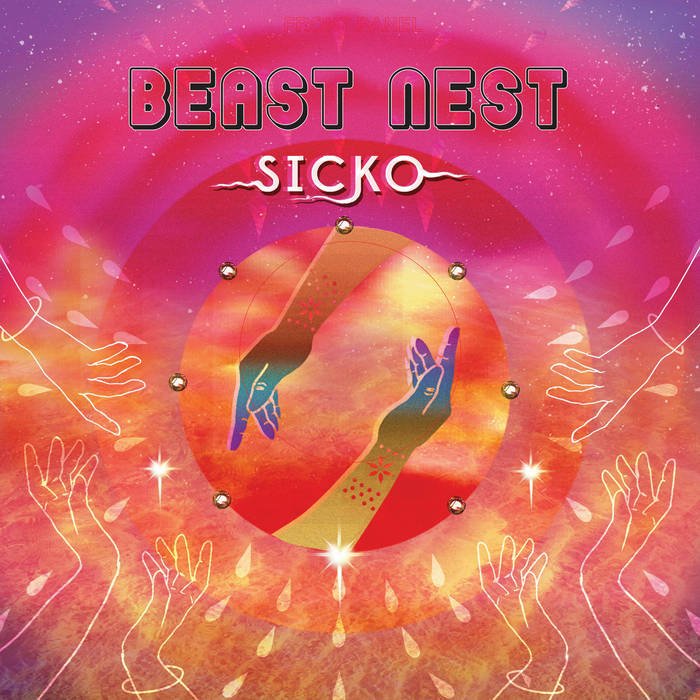Album Review: Beast Nest – Sicko
Album Review: Beast Nest – Sicko
March 29, 2022
Adán Falcón
Oakland-based sound artist Sharmi Basu (aka Beast Nest) released their latest album Sicko back in January. Adán had the opportunity to break down the listening experience with Basu and reports back for this review. While the album processes the grief from the Ghost Ship fire of 2016, it also dives deep into music’s place in healing, importantly removed from individualism and the “wellness” space.
“Wellness” often takes a form of distance away from life, in order to provide an individual a moment to recover or protect their mental health. As a multi-trillion dollar business, however, it’s hard not to feel suspicious of its products or advice that provide a quick-fix, only to encourage this sense of distance. Music platforms and artists capitalize on this distance as well, creating content –like playlists or albums– that produces environments for escapist ambience, passive enough to make labor tolerable, or to make the self at the center of everything, detached from the outside world.
Beast Nest’s (aka Sharmi Basu) new album Sicko, released under Ratskin Records, deals with the themes of wellness and self-care, but not in a capitalist-centric way. Instead, their album is a challenge to the idea of music acting as a passive tool for achieving a specific ambience– rather, music’s potential to challenge “our perceived identity, our space.”
Sicko comes out of the aftermath of 2016’s Ghost Ship warehouse fire, as a way to help them process the grief from the experience. Alongside this, they built a community around them and found tools to them, from medication to the disability justice community, to their fellow "sick in the head friends who are dedicated to working on themselves and with each other.” This likely explains the warmth felt on this album compared to their previous works, such as Songs for Puppies, that have a more austere quality to them. Pieces of the ideas they explored in their previous musical output finally start to gel on this album, as Sicko builds on previous sounds they had explored, with abstract ideas being more grounded with sounds from and references to the outside world.
Much of Basu’s work is influenced by their schooling, studying with major figures of the experimental music scene at Mills College. Influenced by figures such as Fred Frith, Roscoe Mitchell, John Bischooff, and Pauline Oliveros, Basu’s own artistic practice is rooted in audience participation. These influences are evident on the surface, especially with several of the songs on Sicko as rooted in improvisation, which makes the album slightly intimidating at first listen. However, even from “Relief/Refuge,” Basu grounds the listener with a vocal sample from the 1998 Bollywood rom-com Kuch Kuch Hota Hai. The vocals come in distorted, warm yet haunting, and contrasts with the layers of synths and sounds adding to this warmth. Then there’s a shift to industrial textures, never feeling aggressive, but hypnotic until it reverts to a warmer tone by the end of the track.
The hypnotic quality that runs through most of the album with sounds or notes coming in and out, soft or sharp, provide a form of refuge. The different layers of sounds Basu plays with throughout the album contradict each other. Yet, it works, as each layer provides an inviting space for its opposite’s qualities: something sharp to bring out the melodies, a sustained note to illuminate the arpeggios bubbling up, or a slight dance beat to loop in the dissonant layers of the song.
In one of the best tracks of the album, “Kim, People Are Dying,” a path is shown where Basu plays with expectations of creating something familiar (using the Kardashian reference, the downtempo beats and ambience, etc.), but still fulfills an experimental vision due to its improvisation. Once the beat comes in, the track transitions to an almost regular dance song. Suddenly, the percussion is stuck in a loop, as it mixes with water effects and scraggly layers improvised through the rest of the track. Essentially, it’s a breakdown through the second half of the track. Yet, instead of this alienating the listener, there are enough riches and curiosities there to want to see what else the album has to provide.
Beast Nest’s Sicko already feels like a contender for one of the best releases of the year, without needing to lean heavily on the false sense of warmth and distance perpetuated by the wellness industry, but finding a creative path to invite the listener into Basu’s world. It’s built with experiments with sounds from another world, mixed with some pop culture. Theirs is a world where the internal world can cope with the external world using whatever tools bring a sense of joy, with community, without judgments.
Adán Falcón (he/him) is a grad school dropout, writer, and live music fanatic. Nowadays, you can find him running long distance with a playlist of krautrock and early 2000's hip hop, and rummaging record stores for limited edition vinyl.



